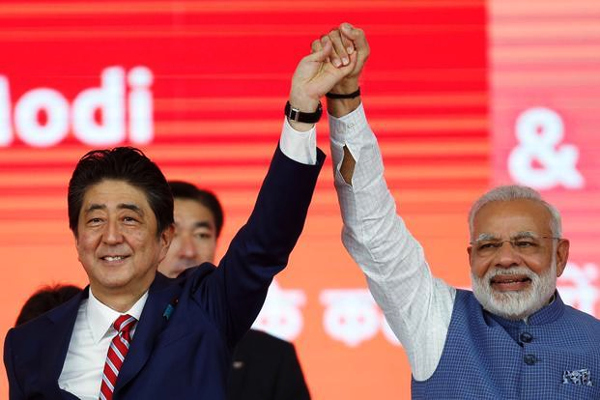As the chair of G20 Summit in Osaka, Prime Minister Abe has announced in the segment of energy and environment session that space debris is one of the environmental issues that requires attention. He claimed that satellites are indispensable for monitoring climate changes and deterioration of ocean environment by plastics wastes. Although space was not the agenda for G20 Summit meetings, it is one of the concerns that Japan considers international coordination plays a key role.
In addition to the environmental security, Japan and India are closing their gaps on the use and operation of space systems for peace and security in the context of Free and Open Indo-Pacific (FOIP) Initiative. Japan and India have conducted 5 meetings as “2+2” (Foreign and Defense meetings) at Administrative Vice Minister level. While these meetings were significant signs for enhancing ties between Japan and India, it was limited to the administrative levels. But from this year, the “2+2” meetings are upgraded to Ministerial level to give more political importance.
Traditionally, Japan’s Defense Programs were designed for exclusively self-defense due to the constitutional constraints. Japan’s Constitution Article 9 prohibits it to exercise collective self-defense and allows only to possess minimum capability to defend itself. Thus, it had to rely on the alliance with the United States. However, the “America First” policy of President Trump and its Administration’s hostility over the lack of spending on defense expenditure made Japan anxious that the United States is not heavily committed to the defense of Japan as it did in previous Administrations. In fact, President Trump complained that the alliance with Japan is one-sided because US is obliged to defend Japan while Japan has no obligation to fight with US if it is attacked. Also, he complained that Japan is not spending enough money on its defense. These remarks prove some part of Japan’s anxiety on the commitment of the US to the sixty-year old Security Treaty.
Thus, Japan is hedging the risk by extending its network of alliances. Although US has been and will be the most important ally, it has building more closer ties with European partners such as UK and France, and other partners in Indo-Pacific such as Australia. India, as a partner of Quad – US, Japan, Australia and India to counter emerging Chinese influences in Indo-Pacific – countries, was last piece of the network to be completed. This upgrading of “2+2” dialogue to political level is the final touch for completing Quad partnership. The coming “2+2” Ministerial meeting will be, therefore, extremely important for Japan to secure wider security alliance to reduce dependency on the alliance with US.
The major subjects for next “2+2” meeting include the cooperation in cyber and outer space. These two domains are the new addition to the National Defense Program Guidelines which was adopted in December 2018. There is a growing awareness that Japan had ragged behind these domains largely due to the concentration on the threat from China on Senkaku islands and from North Korea on ballistic missiles. Thus, majority of Japanese defense spending went to missile defense capabilities and maritime defense. However, the threat from China and North Korea is not limited to the traditional security. These two countries possess capabilities for cyber and space attacks which may undermine the capabilities of Japan and its allied forces to take countermeasures for physical attacks. The Japanese National Security Strategy defines the “gray-zone” incidents such as civilian fishermen occupying Senkaku islands. Japan regards the attacks in cyber and space also constitute new “gray-zone” cases.
Under such consideration, Japan regards India as a valuable partner. On the one hand, India has strong capabilities in IT engineering and space technology. The number of successful companies and individuals in IT business shows that India is the heart of the cutting-edge cyber technology. Japanese National Defense Program Guidelines suggests that it aims to develop a capability to retaliate if cyber-attack took place on its critical infrastructure. Cooperation with India is expected to produce a joint effort to develop such a capability.
Meanwhile Japan does not appreciate the debris-creating kinetic ASAT (Anti-satellite) test conducted by DRDO (Defense Research and Development Organization) in March this year, it recognizes the importance of developing resilience and mission assurance capabilities in space. Satellites are used for
C4ISR (Command, Control, Communications, Computing, Intelligence, Surveillance, and Reconnaissance) and it can be targeted by hostile forces by kinetic or non-kinetic attacks. Also, there are threats of space debris hitting those satellites with high velocity, which would cause malfunctioning of these vital satellites. Thus, it is imperative to develop shared and interoperable capabilities in case of losing these space-based services. Cooperation between Japan and India would construct an ideal partnership in terms of high level of technological capabilities and satellite positioning in orbits. Japanese geostationary satellites are located on the latitude of East 110 degrees whereas Indian satellites are in East 70-80 degrees. Japan and India both operate regional navigation satellites, QZSS and IRNSS. These locations and compatible capabilities will contribute to secure continuation of missions if satellite capabilities are damaged in case of intentional or non-intentional attacks.
Japan and India certainly have a lot in common and complement each other. The “2+2” Ministerial meeting will cement our ties for ideal strategic partnership, especially in new security domains.
Source: FE
Image Courtesy: LM
You may also like
-
IAF Aircraft Set Course For Exercise Eastern Bridge VII At Oman
-
India-us Working Together In Areas Like Critical Minerals, Supply Chains And Advanced Technologies: Shri Piyush Goyal
-
Defence Secretary to co-chair 5th India-Philippines Joint Defence Cooperation Committee meeting in Manila
-
2nd India-Japan Finance Dialogue held in Tokyo on 6th September, 2024
-
Prime Minister, Shri Narendra Modi welcomes Crown Prince of Abu Dhabi
